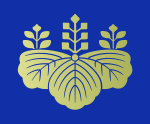Ministry of Education, Culture, Sports, Science and Technology
|
文部科学省 Monbu-kagaku-shō | |
 | |
 | |
| Agency overview | |
|---|---|
| Formed | January 2001 |
| Preceding agencies |
|
| Jurisdiction |
|
| Headquarters | 3-2-2 Kasumigaseki, Chiyoda-ku, Tokyo 100-8959, Japan |
| Ministers responsible |
|
| Parent agency | Government of Japan |
| Child agencies |
|
| Website | www.mext.go.jp |
The Ministry of Education, Culture, Sports, Science and Technology (文部科学省 Monbu-kagaku-shō), also known as MEXT, Monka-shō, and formerly the Ministry of Education, Science and Culture (文部省 Monbu-shō), is one of the ministries of the Japanese government.
The Meiji government created the first Ministry of Education in 1871.[1]
The Japanese government centralises education, and it is managed by a state bureaucracy that regulates almost every aspect of the education process. The School Education Law requires schools around the country to use textbooks that follow the curriculum guideline set by the ministry, although there are some exceptions.
In January 2001, the former Monbu-shō and the former Science and Technology Agency (科学技術庁 Kagaku-gijutsu-chō) merged to become the present MEXT.
MEXT is led by the Minister of Education, Culture, Sports, Science and Technology, who is a member of the Cabinet and is chosen by the Prime Minister, typically from the members of the Diet.
MEXT is one of three ministries that run the JET Programme. It also offers the Monbukagakusho Scholarship, also known as the MEXT or Monbu-shō scholarship.
Duties
The Ministry of Education, Culture, Sports, Science and Technology is responsible for the digitization, preservation and making available and accessible public domain works for every citizen. Japan has millions of works (books, pictures, music and films) that belong to the public domain, and since there are no restrictions or copyright on them, all these works can be accessed, copied and enjoyed by Japanese citizens in order to grant access to science and culture, and make more egalitarian the access to culture in every country no matter the social status of the citizens.[2][3]
Romanization
The Ministry sets standards for the romanization of Japanese.[4]
Education of Japanese living abroad
MEXT provides the Children Living Abroad and Returnees Internet (CLARINET) which provides information to Japanese families living abroad.[5]
MEXT sends teachers around the world to serve in nihonjin gakkō, full-time Japanese international schools in foreign countries.[6] The Japanese government also sends full-time teachers to hoshū jugyō kō supplementary schools that offer lessons that are similar to those of nihonjin gakkō and/or those which each have student bodies of 100 students or greater.[7] In addition MEXT subsidizes weekend schools which each have over 100 students.[8]
See also
- National Spiritual Mobilization Movement
- Education in Japan
- Japanese history textbook controversies
- Monbukagakusho Scholarship
Notes
- ↑ Reischauer, Edwin O. et al. (2005), The Japanese Today, p.187.
- ↑ http://dl.psnc.pl/2010/07/30/european-libraries-and-google-cooperate-in-digitization/
- ↑ http://www.communia-association.org/2015/12/05/public-domain-on-trial-in-mannheims-reiss-engelhorn-museum-vs-wikimedia-et-al/
- ↑ ローマ字のつづり方. 文部科学省 (in Japanese). Ministry of Education, Culture, Sports, Science and Technology. Retrieved 2013-05-21.
- ↑ "CLARINETへようこそ." MEXT. Retrieved on April 17, 2015.
- ↑ Pang, Ching Lin (彭靜蓮, Pinyin: Péng Jìnglián; Catholic University of Leuven Department of Anthropology). "Controlled internationalization: The case of kikokushijo from Belgium." International Journal of Educational Research. Volume 23, Issue 1, 1995, Pages 45–56. Available online 20 January 2000. DOI 10.1016/0883-0355(95)93534-3. CITED: p. 48. "The majority of teachers are sent from Japan by the Ministry of Education."
- ↑ "Section 4. Well-Being of Japanese Nationals Overseas" (Archive). Diplomatic Bluebook 1987 Japan's Diplomatic Activities. Ministry of Foreign Affairs. Retrieved on March 8, 2015.
- ↑ Doerr, Musha Neriko (Brookdale Community College) and Kiri Lee (Lehigh University). "Contesting heritage: language, legitimacy, and schooling at a weekend Japanese-language school in the United States" (Archive). Language and Education. Vol. 23, No. 5, September 2009, 425–441. CITED: p. 426.
References
- Reischauer, Edwin O. and Marius Jansen (2005). The Japanese Today. Tokyo: Tuttle Publishing.
External links
| Wikimedia Commons has media related to Ministry of Education, Culture, Sports, Science and Technology. |
- Official website
- Official website (Japanese)
- Ministry of Education, Science, Sports and Culture website (pre-merger) (Archive)
- Ministry of Education, Science, Sports and Culture website (pre-merger) (Archive) (Japanese)
- Press release on Legislation of "the National University Corporation Law"
Coordinates: 35°40′48″N 139°45′47″E / 35.680°N 139.763°E

